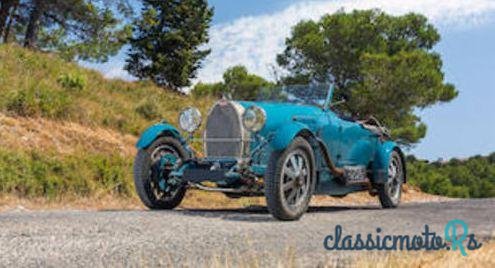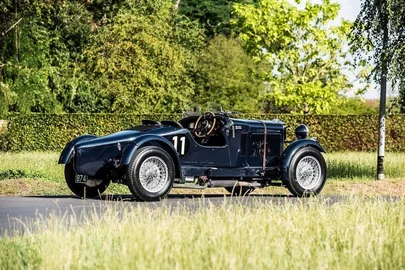
1928' Bugatti Torpedo Grand Sport
Report This Ad!Rate This!Bookmark This
€558,700Published 30 August 2017ID: utTvKp
Expired
8 years, 5 months ago
8 years, 5 months ago
Information from the owner
Body: Sports Car
Age: 89 years
Exterior color: Brown
Seller's comments about 1928' Bugatti Torpedo Grand Sport
Bonhams are delighted to offer at our forthcoming Collectors' Motor Car Auction on Sunday 10th September at The Chantilly Sale, Château de Chantilly, France, 34 collectors motor cars.
1928 Bugatti Torpedo Grand Sport
Chassis no. 44366 (see text)
•Bugatti front axle, gearbox, and rear axle
•Engine by Ventoux Moteurs and Laurent Rondoni
•Pierre Yves Laugier report on file
•EU registered
By the early 1930s Ettore Bugatti had established an unrivalled reputation for building cars with outstanding performance on road or track; the world's greatest racing drivers enjoying countless successes using the Molsheim factory's products and often choosing them for their everyday transport.
His earlier efforts notwithstanding, the foundation of Bugatti's not inconsiderable repute was his family of eight-cylinder cars, the first of which – the Type 30 – appeared in 1922. The Type 30 shared its chassis, axles and gearbox with the later four-cylinder Type 13 Brescia model and was powered by an inline eight displacing 1,991cc. Developments of this superb engine, with its single overhead camshaft and three valves per cylinder, would go on to power the Type 35 Grand Prix car, the Type 38 tourer and Type 43 sports car.
Introduced in 1927, the Type 43 was, in essence, a road-going version of Bugatti's most successful Grand Prix racing car, the Type 35. The Type 43 used the 2,262cc engine, complete with Roots supercharger, introduced on the Type 35B, which was installed in a new chassis similar to that of the Grand Prix racer. Type 35 wheels were used, together with the larger radiator and brakes also found in the Type 38. Not surprisingly, considering its Grand Prix derivation, the Type 43 proved immensely successful in sports car racing, being campaigned by the factory and a host of private owners.
This Bugatti Type 43 has been built on a recent chassis to the original pattern. It incorporates three major in-period components: the front axle, gearbox, and rear axle, while the engine has been built by France's foremost Bugatti Specialist: Ventoux Moteurs in Carpentras. Needless to say, with such a pedigree this car will perform better than an entirely original example.
The chassis plate is of the 'Alsace' type (correct for the period) and is numbered '44366'. This number corresponds with a brown Type 44 Torpedo, sold new to minister Achille Fould in April 1928. The plate was given to the owner by his friend, François Chevalier, and comes from a vehicle scrapped in the South West of France
The chassis had been built in 1990 for Laurent Rondoni and is of the correct wheelbase (2.97m) for a Type 43. A Bugatti specialist, Laurent Rondoni had accumulated many of the parts needed to build a Type 43. As it happened, he did not have time to complete he project, which was purchased by the current vendor.
Of the mechanical parts: the rear axle is original while the gearbox is a Type 44 (number '255') from a car produced in Spring 1928. It was supplied by the UK's foremost Bugatti specialist, Brineton Engineering of Walsall, West Midlands. The front axle (number '707') comes from a Type 44.
The 2.3-litre engine is entirely the work of Ventoux Moteurs in Carpentras, and has been assembled by Laurent Rondoni. The clutch is the classic Bugatti type. The radiator has been overhauled and an additional oil tank fitted beneath the passenger's seat, as on the Bugatti racing cars. The fuel tank comes from a touring Bugatti.
The aluminium coachwork was fabricated in France towards the end of the 1990s by the specialist, Patrick Barrier. Torpedo in style, it is similar to that of the three Type 43 Bugattis entered in the RAC Tourist Trophy in August 1928. There is only one door (on the driver's side) while the Type 57S seats have been cut down to fit the Torpedo body. The dashboard boasts original SEV instruments, a period-correct Jaeger 8-day timepiece, a Ki Gass pump, and pressure gauges supplied by Vintage Restorations in Kent. Weighing approximately 1,040kg, this particular car is some 10km/h faster than the original model, with a top speed of around 170km/h.
In conclusion: this car has been built with many original Bugatti parts, most of which come from Type 44, a model very similar to the Type 43. Serviced regularly by Ventoux Moteurs, it is in generally excellent condition and makes an amazing sound thanks to the very special exhaust. Accompanying documentation consist of a French Carte Grise and a detailed report compiled by Bugatti authority, Pierre Yves Laugier.
1928 Bugatti Torpedo Grand Sport
Chassis no. 44366 (see text)
•Bugatti front axle, gearbox, and rear axle
•Engine by Ventoux Moteurs and Laurent Rondoni
•Pierre Yves Laugier report on file
•EU registered
By the early 1930s Ettore Bugatti had established an unrivalled reputation for building cars with outstanding performance on road or track; the world's greatest racing drivers enjoying countless successes using the Molsheim factory's products and often choosing them for their everyday transport.
His earlier efforts notwithstanding, the foundation of Bugatti's not inconsiderable repute was his family of eight-cylinder cars, the first of which – the Type 30 – appeared in 1922. The Type 30 shared its chassis, axles and gearbox with the later four-cylinder Type 13 Brescia model and was powered by an inline eight displacing 1,991cc. Developments of this superb engine, with its single overhead camshaft and three valves per cylinder, would go on to power the Type 35 Grand Prix car, the Type 38 tourer and Type 43 sports car.
Introduced in 1927, the Type 43 was, in essence, a road-going version of Bugatti's most successful Grand Prix racing car, the Type 35. The Type 43 used the 2,262cc engine, complete with Roots supercharger, introduced on the Type 35B, which was installed in a new chassis similar to that of the Grand Prix racer. Type 35 wheels were used, together with the larger radiator and brakes also found in the Type 38. Not surprisingly, considering its Grand Prix derivation, the Type 43 proved immensely successful in sports car racing, being campaigned by the factory and a host of private owners.
This Bugatti Type 43 has been built on a recent chassis to the original pattern. It incorporates three major in-period components: the front axle, gearbox, and rear axle, while the engine has been built by France's foremost Bugatti Specialist: Ventoux Moteurs in Carpentras. Needless to say, with such a pedigree this car will perform better than an entirely original example.
The chassis plate is of the 'Alsace' type (correct for the period) and is numbered '44366'. This number corresponds with a brown Type 44 Torpedo, sold new to minister Achille Fould in April 1928. The plate was given to the owner by his friend, François Chevalier, and comes from a vehicle scrapped in the South West of France
The chassis had been built in 1990 for Laurent Rondoni and is of the correct wheelbase (2.97m) for a Type 43. A Bugatti specialist, Laurent Rondoni had accumulated many of the parts needed to build a Type 43. As it happened, he did not have time to complete he project, which was purchased by the current vendor.
Of the mechanical parts: the rear axle is original while the gearbox is a Type 44 (number '255') from a car produced in Spring 1928. It was supplied by the UK's foremost Bugatti specialist, Brineton Engineering of Walsall, West Midlands. The front axle (number '707') comes from a Type 44.
The 2.3-litre engine is entirely the work of Ventoux Moteurs in Carpentras, and has been assembled by Laurent Rondoni. The clutch is the classic Bugatti type. The radiator has been overhauled and an additional oil tank fitted beneath the passenger's seat, as on the Bugatti racing cars. The fuel tank comes from a touring Bugatti.
The aluminium coachwork was fabricated in France towards the end of the 1990s by the specialist, Patrick Barrier. Torpedo in style, it is similar to that of the three Type 43 Bugattis entered in the RAC Tourist Trophy in August 1928. There is only one door (on the driver's side) while the Type 57S seats have been cut down to fit the Torpedo body. The dashboard boasts original SEV instruments, a period-correct Jaeger 8-day timepiece, a Ki Gass pump, and pressure gauges supplied by Vintage Restorations in Kent. Weighing approximately 1,040kg, this particular car is some 10km/h faster than the original model, with a top speed of around 170km/h.
In conclusion: this car has been built with many original Bugatti parts, most of which come from Type 44, a model very similar to the Type 43. Serviced regularly by Ventoux Moteurs, it is in generally excellent condition and makes an amazing sound thanks to the very special exhaust. Accompanying documentation consist of a French Carte Grise and a detailed report compiled by Bugatti authority, Pierre Yves Laugier.


